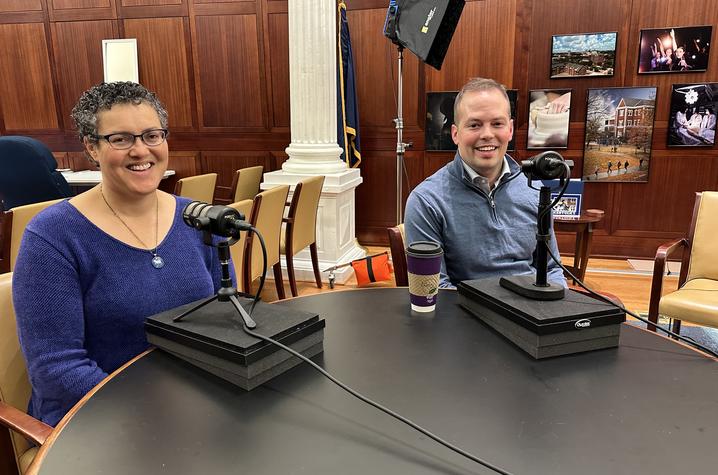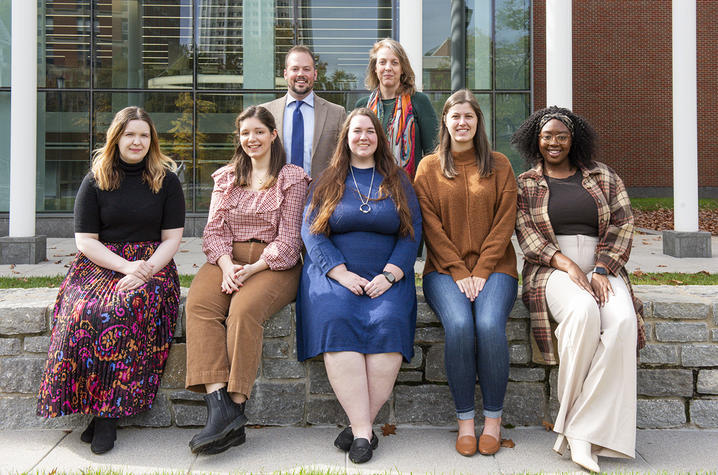By Kody Kiser and Jenny Wells-Hosley

LEXINGTON, Ky. (Feb. 6, 2024) — “Every single one of them said, ‘My God, I had no idea something like this happened.’ I think they are learning something about their communities that they didn’t know before.”
Anastasia Curwood, history professor and director of the Commonwealth Institute for Black Studies at the University of Kentucky, is referring to the reaction of students to their work with the groundbreaking Civil Rights and Restorative Justice (CRRJ)-Kentucky project, a pilot program stemming from the pioneering CRRJ project at Northeastern University School of Law. Prompted by the national project and working with UK's J. David Rosenberg College of Law, they recognized the urgent need to address unsolved murders in Kentucky tied to racism or racial hostility.
Margaret Burnham, an internationally recognized expert on civil and human rights who leads the original program at Northeastern, came to UK in the fall to help formally launch the Kentucky project. The multidimensional approach encompasses legal seminars, historical research and a restorative justice element, intertwining legal expertise and historical context to unravel mysteries dating back through the past 100 years.
"Law and history are kind of detective disciplines," Curwood said. "We like to go back, excavate evidence, find it, build a case. And so I, as a historian, knew that we had a very capable emerging career historian — Austin Zinkle — who was perfectly poised to do that."
Zinkle, a postdoctoral scholar in the UK College of Arts and Sciences, joined forces with D'lorah L Hughes, the H. Wendell Cherry Associate Professor of Law and director of Clinics and Externships in the Rosenberg College of Law, to begin building the project last spring. Zinkle and Hughes say the project is bridging the gap between academic disciplines, offering students the opportunity to delve into cold cases that state agencies, hindered by resource constraints, often overlook or are unable to continue work on.
“We really see this project as an opportunity to engage in disciplines throughout UK," Zinkle said. "Right now it’s history, law, and African-American and Africana studies, but there are opportunities already in the pipeline (with) journalism, geography, sociology and anthropology – just to name a few.”
"This pilot program at UK Law is not merely a project of historical research; this historical justice work calls for creative lawyering," said Hughes. "In these cases, law students will face complex, messy problems for which there will be many different responses across a wide range of clients, communities and claimants seeking justice."

The team also notes that the project is successfully contributing to the university’s mission of advancing Kentucky. The significance lies not only in its historical inquiry but also in its potential to redefine how Kentuckians perceive their past. By investigating historical wrongs, the project seeks to create a more honest narrative of the Commonwealth, acknowledging the lasting impact on families and communities, which include descendants of victims who are still living today.
“We are the Commonwealth Institute for Black Studies — we are looking to benefit the Commonwealth of Kentucky and the potential for healing,” Curwood said.
Zinkle agrees. “I think what this project can really help accomplish is to investigate these historical wrongs and find ways that we can create a more honest answer of what the Commonwealth looks like for everybody.”
On this latest episode of "Behind the Blue," Curwood and Zinkle discuss the intricate connections between the past and present, and their efforts to shed light on real traumas and historical injustices that continue to shape Kentucky today. Listen to the full podcast above.
For questions or comments related to the CRRJ-KY project, contact co-leaders D’lorah Hughes at dlorah.hughes@uky.edu or Austin Zinkle at austin.zinkle@uky.edu.
***
"Behind the Blue" is available on iTunes, Google Play and Spotify. Become a subscriber to receive new episodes of “Behind the Blue” each week. UK’s latest medical breakthroughs, research, artists and writers will be featured, along with the most important news impacting the university.
Transcripts for this or other episodes of Behind the Blue can be downloaded from the show’s blog page.
To discover what’s wildly possible at the University of Kentucky, click here.
As the state’s flagship, land-grant institution, the University of Kentucky exists to advance the Commonwealth. We do that by preparing the next generation of leaders — placing students at the heart of everything we do — and transforming the lives of Kentuckians through education, research and creative work, service and health care. We pride ourselves on being a catalyst for breakthroughs and a force for healing, a place where ingenuity unfolds. It's all made possible by our people — visionaries, disruptors and pioneers — who make up 200 academic programs, a $476.5 million research and development enterprise and a world-class medical center, all on one campus.
In 2022, UK was ranked by Forbes as one of the “Best Employers for New Grads” and named a “Diversity Champion” by INSIGHT into Diversity, a testament to our commitment to advance Kentucky and create a community of belonging for everyone. While our mission looks different in many ways than it did in 1865, the vision of service to our Commonwealth and the world remains the same. We are the University for Kentucky.
